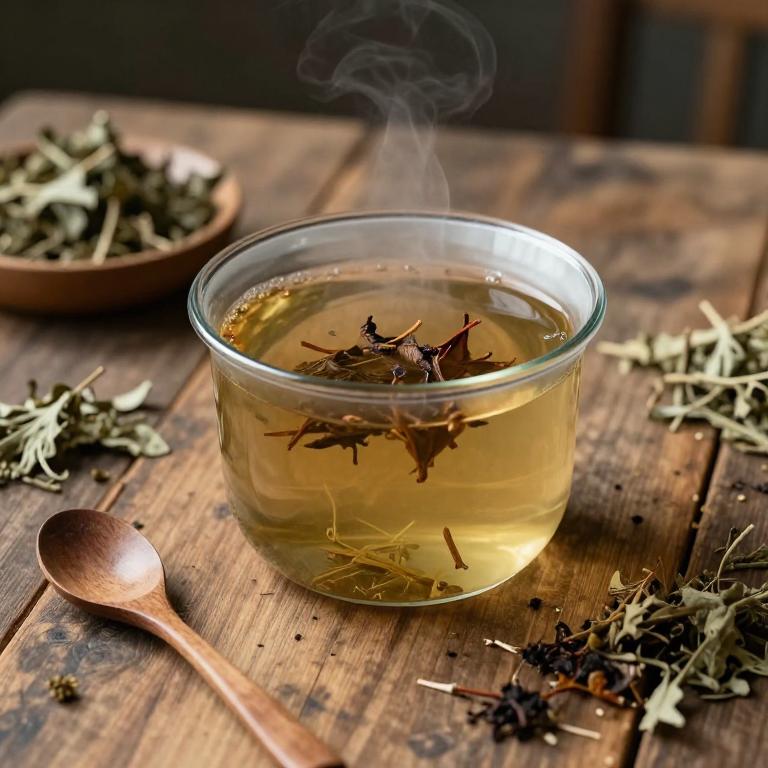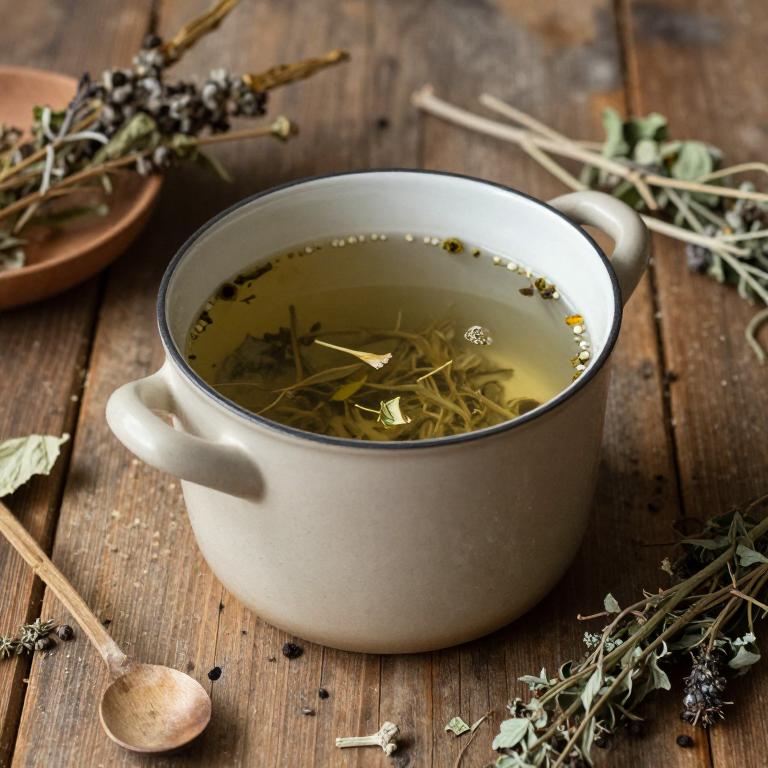10 Best Herbal Decoctions For Bleeding Spots In Mouth

Herbal decoctions have been traditionally used to address bleeding spots in the mouth, often attributed to inflammation, infection, or injury.
Common herbs such as chamomile, licorice root, and calendula are known for their anti-inflammatory and astringent properties, which can help soothe irritated tissues and promote healing. These decoctions are typically prepared by simmering the dried herbs in water for several minutes, then allowing the liquid to cool before use. Some herbal formulations may also include honey or other natural ingredients to enhance their soothing effects.
While herbal decoctions can provide relief, it is important to consult a healthcare professional to rule out more serious underlying conditions.
Table of Contents
- 1. Salvia (Salvia officinalis)
- 2. Echinacea (Echinacea purpurea)
- 3. St. john's wort (Hypericum perforatum)
- 4. Stinging nettle (Urtica dioica)
- 5. Chaste tree (Vitex agnus-castus)
- 6. Marigold (Calendula officinalis)
- 7. Aloe vera (Aloe barbadensis)
- 8. Sanguisorba (Sanguisorba officinalis)
- 9. Dog rose (Rosa canina)
- 10. Rosemary (Rosmarinus officinalis)
1. Salvia (Salvia officinalis)

Salvia officinalis, commonly known as sage, has been traditionally used in herbal medicine for its potential to address oral health issues, including bleeding spots in the mouth.
Herbal decoctions made from dried sage leaves are often prepared by simmering the plant material in water to extract its active compounds, such as rosmarinic acid and flavonoids, which are believed to have anti-inflammatory and astringent properties. These properties may help reduce inflammation, promote tissue healing, and strengthen oral mucosa, potentially alleviating bleeding spots. While some studies suggest sage's efficacy in oral care, more clinical research is needed to confirm its effectiveness and safety for this specific use.
As with any herbal remedy, it is advisable to consult a healthcare professional before using sage decoctions, especially for persistent or severe oral conditions.
2. Echinacea (Echinacea purpurea)

Echinacea purpurea, commonly known as purple coneflower, has been traditionally used in herbal medicine for its potential anti-inflammatory and immune-boosting properties.
Herbal decoctions made from Echinacea purpurea are often prepared by boiling the dried roots, leaves, and flowers in water to extract their active compounds. These decoctions may help reduce inflammation and promote healing in cases of oral ulcers or bleeding spots in the mouth. However, while some studies suggest possible benefits, more research is needed to confirm its efficacy and safety for this specific use.
It is important to consult a healthcare professional before using Echinacea, especially for individuals with allergies or those taking other medications.
3. St. john's wort (Hypericum perforatum)

Hypericum perforatum, commonly known as St. John's wort, has been traditionally used in herbal medicine for its potential anti-inflammatory and wound-healing properties.
When prepared as a herbal decoction, it may help reduce inflammation and promote healing in oral mucosal tissues, potentially aiding in the management of bleeding spots in the mouth. The active compounds in Hypericum perforatum, such as hypericin and flavonoids, are believed to contribute to its therapeutic effects by modulating immune responses and reducing oxidative stress. However, it is important to note that while some studies suggest its efficacy, more clinical research is needed to confirm its safety and effectiveness for oral conditions.
As with any herbal remedy, it should be used under the guidance of a healthcare professional, especially for individuals taking other medications, due to possible interactions.
4. Stinging nettle (Urtica dioica)

Urtica dioica, commonly known as stinging nettle, has been traditionally used in herbal medicine for its potential health benefits, including its application in addressing bleeding spots in the mouth.
Herbal decoctions made from the leaves and stems of Urtica dioica are believed to possess anti-inflammatory and astringent properties that may help in reducing oral irritation and promoting healing. These decoctions are typically prepared by simmering the dried plant material in water for an extended period to extract its active compounds. Some practitioners recommend using nettle decoctions as a mouth rinse to soothe ulcers and reduce bleeding due to their high mineral content and natural antiseptic qualities.
However, it is important to consult a healthcare professional before using nettle-based remedies, especially for persistent or severe oral conditions.
5. Chaste tree (Vitex agnus-castus)

Vitex agnus-castus, commonly known as chaste tree, has been traditionally used in herbal medicine for various health conditions, including hormonal imbalances and menstrual disorders.
Its herbal decoctions may help in reducing inflammation and promoting healing, which could potentially support the body's natural recovery from bleeding spots in the mouth. While there is limited scientific evidence specifically linking vitex to mouth bleeding, some studies suggest its anti-inflammatory and antioxidant properties may contribute to oral health. It is important to consult a healthcare professional before using vitex, especially if symptoms persist or worsen.
As with any herbal remedy, proper preparation and dosage are crucial to ensure safety and effectiveness.
6. Marigold (Calendula officinalis)

Calendula officinalis, commonly known as pot marigold, has been traditionally used in herbal medicine for its anti-inflammatory and hemostatic properties.
Herbal decoctions made from dried calendula flowers are often prepared by simmering the petals in water to extract their active compounds, including flavonoids and triterpenes. These decoctions may help reduce inflammation and promote healing in cases of bleeding spots in the mouth, such as those caused by ulcers or minor injuries. Some studies suggest that calendula can strengthen blood vessels and improve circulation, which may aid in stopping bleeding and accelerating tissue repair.
However, it is advisable to consult a healthcare professional before using calendula decoctions, especially for persistent or severe oral bleeding, to ensure safety and effectiveness.
7. Aloe vera (Aloe barbadensis)

Aloe barbadensis, commonly known as aloe vera, has been traditionally used for its soothing and healing properties, including in the treatment of oral health issues.
Herbal decoctions made from aloe vera leaves can be prepared by simmering the gel or pulp in water, creating a liquid that may help reduce inflammation and promote tissue repair. These decoctions are believed to have antimicrobial and astringent properties that may help in the healing of bleeding spots in the mouth. Some studies suggest that aloe vera may help in reducing the symptoms of conditions like canker sores and oral ulcers.
However, it is important to consult a healthcare professional before using aloe-based remedies, especially for persistent or severe oral bleeding, to ensure safety and proper treatment.
8. Sanguisorba (Sanguisorba officinalis)

Sanguisorba officinalis, also known as narrow-leafed sanguisorba, has been traditionally used in herbal medicine for its potential to address various health issues, including bleeding spots in the mouth.
The plant contains compounds such as tannins and flavonoids, which are believed to have astringent and anti-inflammatory properties that may help in reducing oral bleeding. Herbal decoctions made from Sanguisorba officinalis are prepared by simmering the dried roots or leaves in water, allowing the active constituents to be extracted. These decoctions are often used in traditional remedies to promote healing and reduce inflammation in the oral cavity.
However, it is important to consult with a healthcare professional before using this herb, as it may interact with certain medications or have contraindications for specific health conditions.
9. Dog rose (Rosa canina)

Rosa canina, commonly known as dog rose, has been traditionally used in herbal medicine for its anti-inflammatory and astringent properties.
Herbal decoctions made from Rosa canina fruits are believed to help reduce bleeding spots in the mouth by promoting tissue healing and reducing inflammation. The high content of vitamin C and flavonoids in Rosa canina may contribute to its effectiveness in supporting oral health. These decoctions are typically prepared by simmering the dried fruit in water for several hours to extract the active compounds.
While generally considered safe, it is advisable to consult a healthcare professional before using Rosa canina for persistent oral bleeding to ensure proper diagnosis and treatment.
10. Rosemary (Rosmarinus officinalis)

Rosmarinus officinalis, commonly known as rosemary, has been traditionally used in herbal medicine for its potential healing properties.
Herbal decoctions made from rosemary leaves are believed to support oral health and may help reduce inflammation associated with bleeding spots in the mouth. The essential oils in rosemary, such as cineole and camphor, are thought to have antimicrobial and astringent effects that can promote tissue repair. However, while some anecdotal evidence supports its use, scientific research on its efficacy for specific oral conditions is limited.
It is advisable to consult a healthcare professional before using rosemary decoctions, especially for persistent or severe oral bleeding.